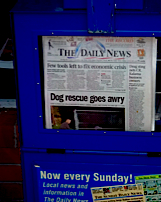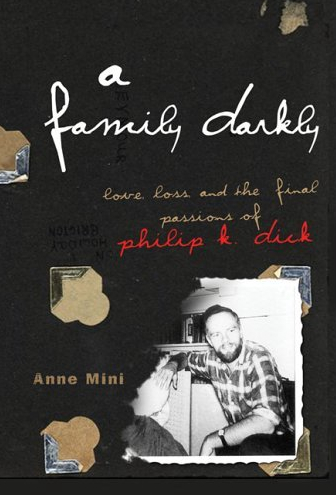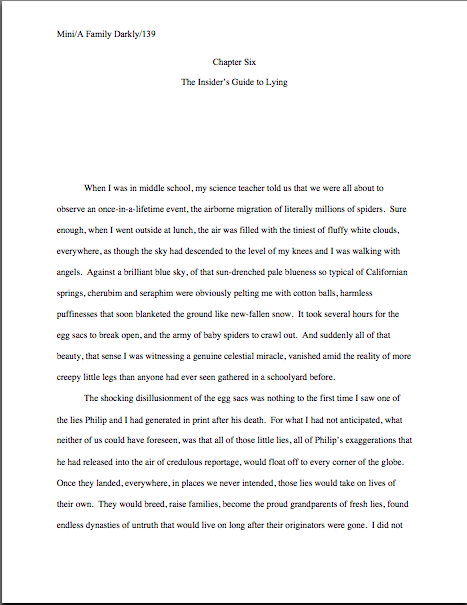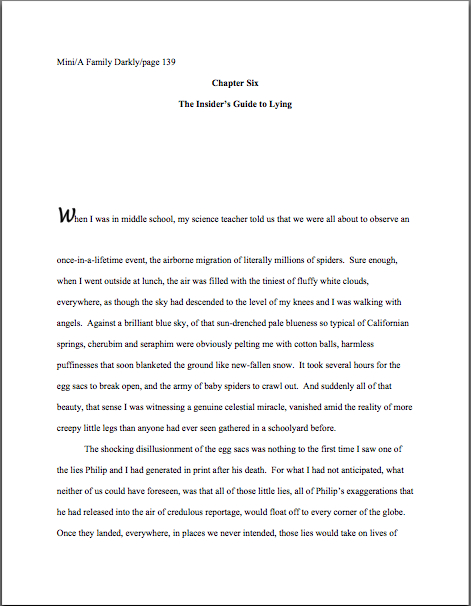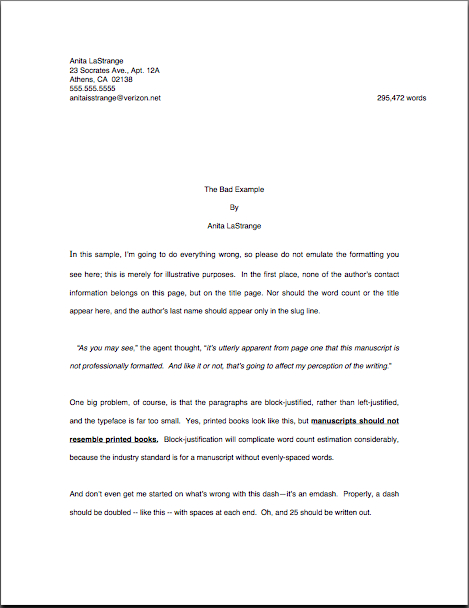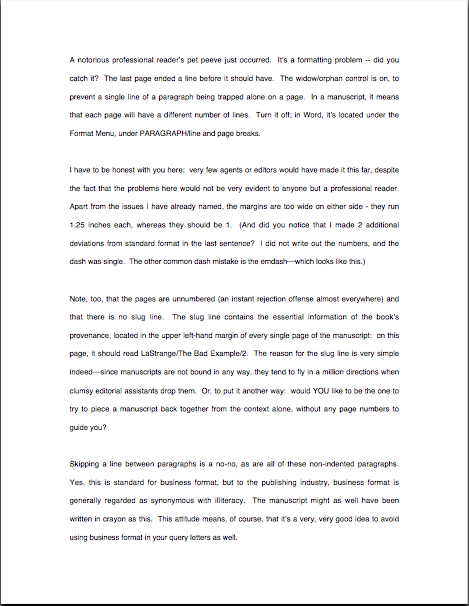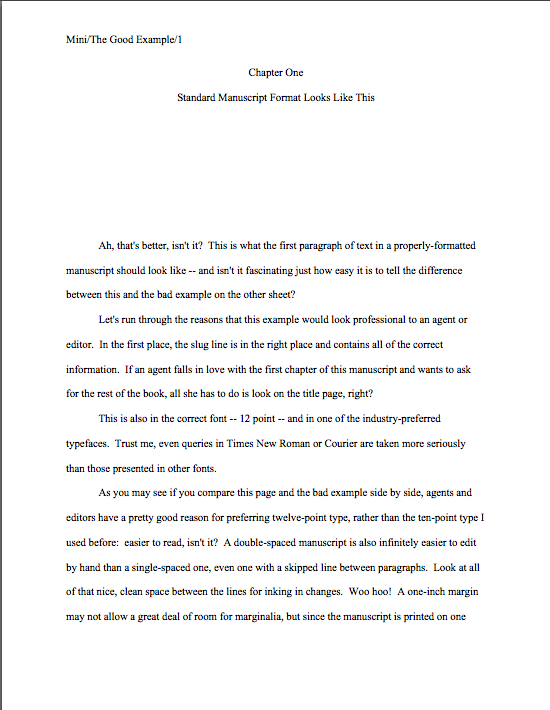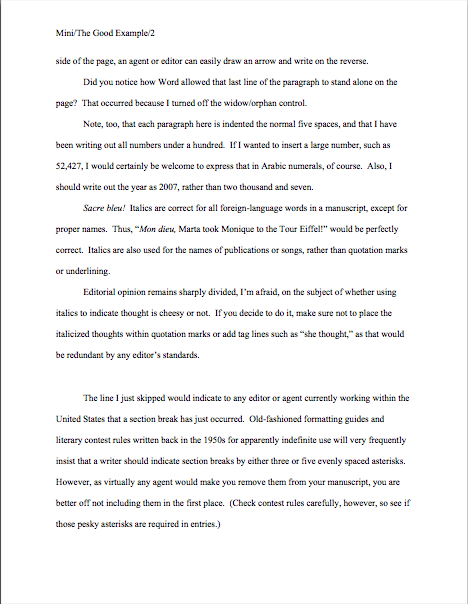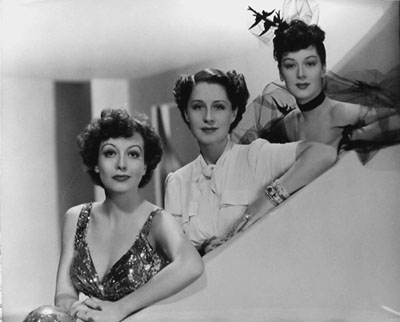Yes, Virginia, that is indeed exactly what it says on the box: a massive grain of salt. You’re going to want to have it on hand for today’s installment in our series on reasons so many submitted manuscripts get rejected on page 1.
How many is so many, you ask? Well, the actual percentage from agency to agency, publishing trend to publishing trend, and even screener to screener, but the last time I conducted informal polling on the subject, the most popular answer amongst US-based agents was, “the vast majority of them.”
Which brings be back one of my perennial caveats to the literal-minded: this is not the definitive list of rejection reasons, so please do not treat it as such. It does, however, include quite a few extremely common rejection triggers that I’ve seldom seen discussed amongst aspiring writers. Do keep your ears perked at conferences for others — trends do change over time and from country to country, and naturally, every agent, like ever other professional reader currently scurrying across the face of the planet, has personal preferences.
All of which is to say: submissions get rejected for a million different reasons, some legitimate, some not. An aspiring writer can’t second-guess every possibility, of course, but it is possible to screen one’s own work for the more common red flags.
Remember, though, that while this list is a pretty good place to start a rigorous look at the first page of your submission, it is just that, a beginning, not a set of absolute standards. Because individuals make rejection decisions, not pre-programmed machines, there’s no such thing as a foolproof, universally-applicable advance test for whether a first page will make it past a screener’s hyper-critical eyes.
Sorry to be the one to tell you that. If breaking into the publishing biz were easy…well, I suspect most of us would be a whole lot happier, but the fact remains, it isn’t.
Which is why, in case you’ve been wondering, the widely-embraced strategy of having an agent who has asked to see pages be the first human being to see a manuscript — or at least the first who is not the author’s relative, bedmate, best friend, or similarly non-objective party — tends not to be a recipe for success. It’s hard to self-edit, and loved ones tend to have an even harder time giving critical feedback. As I shall argue in the series to follow this one, impartial feedback can be immensely helpful in weeding out the problems one might not see in one’s own work.
But I’m getting ahead of myself, amn’t I?
For today, let me limit myself to this: all any aspiring writer can do to prepare for the broad array of preferences amongst agents is to select those who are most likely to be receptive to her work, take extraordinary care to make her manuscript the best it can possibly be (which includes SPELL-CHECKING, people!), and try to weed out the most common red flags.
All fired up to get at ‘em? Good. Happy reading!
The last couple of days’ posts have been kind of in-your-face, haven’t they? Sorry about that — it’s the nature of the beast, I’m afraid, when the ruling out of submissions is the subject. It makes us all feel as if we’ve been mauled by angry wildcats.
A cougar isn’t all that likely to give the individual he’s mauling a good explanation for why he’s doing it, either, I’m told.
Still, there’s no need to despair: to succeed in this business, all you need to do is make your initial pages technically perfect, fresh without being weird, and not hit either any of the pet peeves listed on the Idol list (if that last reference seemed opaque to you, please see the first post in this series) or personal ones that the agent in question might have. Your characters need to be original, your premise interesting, and your plot riveting, beginning from Paragraph 1. Oh, and you need to be lucky enough not to submit your brilliant novel about an airline pilot on the day after the agent/screener/editorial assistant/editor has had his/her heart broken by one.
Piece o’ proverbial cake, right? Well, my work is done here. Let me know how it all turns out!
Okay, so it’s not such a piece of cake: it’s a genuinely tall order, and a long list of don’t can be very, very intimidating. Before you throw up your hands, let’s break down that earlier list of rejection reasons into bite-sized chunks.
The first thing to realize about this list of agents’ pet peeves is that some of them are, in fact, personal pet peeves, not necessarily industry-wide red flags. The trick is recognizing which ones. Right off the bat, a cursory glance at the list, combined with a few decades of experience, lead me to identify the following as probably individual preferences, rather than endemic rejection triggers:
15. The opening had a character do something that characters only do in books, not real life.
25. The first lines were dialogue.
33. Agent can’t identify with the conflict shown.
37. The story is corny.
42. The opening scene is too violent (in the example that generated this response, a baby’s brains were bashed out against a tree).
43. Too gross.
44. There is too much violence to children and/or pets.
46. The story is written in the second person.
47. The story is written in the first person plural.
48. The narrator speaks directly to the reader (“I should warn you…”), making the story hyper-aware of itself qua story.
What makes me these are not widely-shared rejection criteria? Well, observation of what kinds of manuscripts have and haven’t been getting picked up by agents in recent years, but also, critical analysis. Allow me to explain.
Before I start dissecting them, however, one reservation: just because these particular pet peeves are agent-specific does not mean that you should simply disregard them. As with any conference-gleaned wisdom, if you are planning to submit to any of the agents on that particular panel, it would behoove you to take them very seriously indeed: one of the reasons that savvy writers go to conferences, after all, is to pick up information about the specific likes and dislikes of particular agents, right?
Use this information strategically, to help target your queries and submissions to the agents most likely to enjoy your work. But do not, I implore you, fall into the oh-so-common trap of regarding a single individual agent’s expression of a personal preference as a permanent bellwether for the entire industry.
When you’re listening to a panel of agents and/or editors, there are a couple of signals that will alert you to something being an individual’s pet peeve, rather than a general rule. First — and this happens surprisingly frequently — the person uttering it will actually say, “Maybe it’s just my pet peeve, but…” or “It really bugs me when…” Call me zany, but I’ve found that it’s a pretty safe bet that what is said next is a personal preference.
I know: it’s subtle.
Also — and this actually happened on the panel that inspired this series of posts — sometimes an agent will express an opinion, and the other agents will guffaw at him, fall over backwards in surprise, choke on their Diet Cokes, slap him across the face and tell him he’s an idiot, etc.
Again, all of these are pretty good indicators that we’re not talking about a widely-recognized agency norm here. Keep your eyes peeled for such understated clues, conference-goers.
Take, for instance, #25, where an agent red-flagged a submission because the first lines were dialogue. Now, this is a pretty sweeping criticism, isn’t it? A lot of very good books open with dialogue. So how did the people in the Idol audience know it was this particular agent’s pet peeve? Well, he began his critique with, “Maybe it’s just me, but…” And after he said it, the agent sitting next to him turned to him and said, “Really?”
Starting to get the hang of this?
I know I’ve been saying it a lot lately, but it bears repeating: no matter how much talk there is about how agents all want to represent the same kinds of books, it’s just not the case — they are individuals, with individual tastes. And thus, logically, if your submission is rejected by one, you have most emphatically NOT been rejected by the entire industry: you’ve been rejected by one individual within it.
Learn what you can from the experience, then move on.
Just moving on can be very, very tough for writers who have just spent a small fortune on a conference, pitched to five agents, and had requested materials rejected. Yet at even the best conference, no group of agents small enough to fit in the same room, much less on the same panel, are a representative sample of how the entire industry will react to your work.
I’ve said it before, and I shall no doubt say it again: I know it’s discouraging, but it just doesn’t make statistical sense to throw up one’s hands after a single round of rejections.
To put this in perspective, it’s not uncommon for an agent to submit a client’s work to as many as 50 different editors. If #48 says yes, that’s a win and everybody goes out for drinks to celebrate, just as surely as if editor #1 had said yes. Should you really be any less tenacious in marketing your book to agents than you would expect your agent to be in marketing it to editors?
As my last agent was fond of saying in times of strife and slammed editorial doors, you can’t gain a true sense of what the market value of a book is until a whole lot of editors have seen it.
The same goes for agents. Make your submissions as professional as possible, of course, but keep trying.
Now that you know why it is so important to differentiate between what you absolutely must change on your first page and what you should change for a particular agent’s eyes, let’s go back to our list of rejection reasons. When in doubt, ask yourself, “Why is that particular one problematic?” Often, the most obvious answer will be that it’s the agent’s personal opinion.
Let’s apply this test to #15, the opening had a character do something that characters only do in books, not real life. On the panel, an agent with a well-known blog cited this reason quite often, but neither of the other agents mentioned it. (Did that fact alone make your personal-preference antennae perk up, campers?) She gave those who were listening another clue: a couple of times, she cast this objection as, “Well, I’VE never done what the character does here…”
Ding ding ding!
Even if she had not been kind enough to flag this as a personal preference, we probably could have figured it out. In this context, she specifically singled out a character who shook his head to clear an image or bring himself back to reality, as in, “he shook his head to clear the cobwebs.” Now, as an editor myself, I do have to admit, this is an action that one sees occur with GREAT frequency in manuscripts; in fact, I suspect one could make a pretty good case without trying very hard for labeling it as a cliché.
However, this is not how the rejection reason was phrased, was it? No, it was cast as this is something a normal person would never do. Unless we’re talking about psychopathic behavior, a statement like this is almost certainly based upon personal experience. Like everyone’s opinion of beauty, everyone’s opinion of normal is different.
Yes, I did just say that normal is in the eye of the beholder. Got a problem with that?
So what this critique is really saying is, people in my circles and from my background don’t do such things. Fine; good to know: now we can target the submission away from the agent who cannot imagine doing such a thing and toward an agent who can.
Getting the hang of this yet?
The same logic test can be applied, with the same result, to #33 (agent can’t identify with the conflict shown, which is obviously based upon personal taste) and #37 (the story is corny, which must be based upon the observer’s background and worldview). Note the preference, and move on to the next agent. If you get the same response from a few different agents, it might be worth a second look at your opening pages for plausibility.
Actually, that’s not a bad idea in general, since, unfortunately, the vast majority of rejection letters contain no reference whatsoever to the actual reason the agent decided to pass. If your opening contains a real jaw-dropper, it’s possible that you’d never hear about it directly, even in the course of years of submission and rejection.
Yet another reason that getting objective feedback on your work BEFORE you submit it to professional scrutiny is a really, really good idea, right?
Plausibility problems can be particularly tough for a self-editor to catch, as presumably, if a writer includes an incident in a manuscript — like, say, the protagonist’s shaking her head to clear a thought — he personally finds it entirely plausible. For the sake of your revision, though, it is probably worth bearing in mind that an awfully high percentage of NYC-based agents and editors are from upper-middle clad backgrounds, and thus graduated from rather similar English departments at rather similar liberal arts colleges, mostly in the northeastern part of the country. Their brothers (and sisters) dated one another’s sisters (and brothers); their former roommates are mostly from similar backgrounds and hold similar jobs. One may reasonably expect, then, their notions of plausibility to run along similar lines.
If you can’t imagine reading your submission from such a point of view, it might behoove you to find a first reader with a background that permits subjecting your manuscript to what I like to call the Minor Ivy Plausibility Meter: would a 25-year-old who had never lived more than ten miles from the agency where she works — not at all out of the question for denizens of New York-based agencies — find this believable, or would she huff, “Oh, come on…” into her latte?
If you do not be a 25-year-old New Yorker born and bred — and, more to the point, if your protagonist is neither — or if your story takes place in any other part of the world, I would strenuously advise applying this test to at least the first few pages of your submission. Speaking as a writer who has spent hours explaining to New Yorkers what a logging truck is, something any Pacific Northwest 6-year-old could pick out of a police lineup (“That’s it, officer. That’s the truck with the logs!“), you will be happier in the long run if you identify and clarify references that they might not get.
The personal preference test, believe it or not, can also be applied to reasons associated with voice choice. Yes, I know: since it’s a technical matter, it seems as though rules should govern whether it’s acceptable, right?
Not really. There are plenty of agents and editors who don’t like the first person voice much, and, as we saw on the list, other voices may raise hackles: 46. The story is written in the second person; 47. The story is written in the first person plural. What could such statements be OTHER than personal preferences?
#48 (the narrator speaks directly to the reader, making the story hyper-aware of itself qua story) is also a personal preference about narrative voice, albeit a more subtle one: for some readers, including the agent who cited this rejection reason, a first-person narration that breaks the third wall is jarring, a distraction from the story. However, there are plenty examples of published books that have used this device to great comic or dramatic effect.
Despite that fact, I would not send the agent that expressed this preference THE DIARY OF ANNE FRANK, for instance.
Now, I suspect that those of you intrepid souls out there devoted enough to literary experimentation to write a narrative in the first person plural (like THE VIRGIN SUICIDES) or second person (like BRIGHT LIGHTS, BIG CITY) are probably already aware that your work will not be to everyone’s taste, any more than excellent fantasy writing will be to the taste of an agent who prefers hard-bitten realism. But this doesn’t mean that the experiment isn’t worth trying, is it?
Just choose your querying targets accordingly. May I suggest applying first to those who have represented novels with similar voice choices?
I should wrap up for today, but before I do, I want to take a quick run at another group of reasons, #42 (the opening scene is too violent), #43 (the opening scene is too gross), and #44 (there is too much violence to children and/or pets). The first two are obviously in the eye of the beholder: a quick look at any bookstore will tell you that there is no shortage of violent material.
So none of these could possibly be industry-wide peeves, right?
Actually, all three are quite common ones, for the excellent reason that such a high percentage of novel submissions (and often memoir as well) open with scenes of violence. That’s not accidental, of course: if you’ve taken a writing class or attended a literary conference within the last 15 years, you have been exposed to the admonition to grab the reader with action right off the bat. Not a bad idea, but unfortunately, like so much good advice, some of its adherents take it too literally and too far.
And because 99% of the writers out there have had this advice beaten into their brains, too, agents see a LOT of shocking things on first pages. A whole lot of violent death gets strewn across the opening paragraphs that cross Millicent’s desk.
Translation: a super-violent opening scene, then, will not necessarily make your submission unique.
Professional readers’ individual tolerance for violence varies quite a bit, however, so if you are lucky enough to hear one speak (or see one’s blog) about it, pay close attention where that agent draws a line. There’s quite a prominent agent (who has asked that I not report here the things he’s been going around saying at conferences for years, at least not with his name attached) who stands up at every conference he attends and announces that he doesn’t want to see any book that contains scenes with violence to children. While this decree almost invariably produces some scattered groans from his audience (he’s not very tactful), he’s actually doing the people who write violent pieces a favor by being up front about it: he’s trying to prevent them from wasting their time and his in querying him.
The vast majority of agents are not, alas, as up front about their preferences on the subject — which is why I slipped in #44 (there is too much violence to children and/or pets).
Yes, this is a matter of personal preference — how much violence is too much and how much is just right is in the eye of the beholder, just as much as ideal porridge temperatures were on the tongues of the Three Bears — but this one happens to be a preference that at LOT of editors share, and for good reason: it can be very, very hard to market a book that features a lot of violence against wee ones. And don’t even get me started about how hard it would be to sell a cozy mystery with a dead cat in it…
My overall point has, I hope, become clear. Go ahead and yell it out, class.
And the masses cry, “Never kill off the detective’s pet kitty!”
Well, yes, that’s a pretty good rule of thumb, but I was really thinking of a broader point about submission and conference lore: not everything that pops out of an expert’s mouth should be regarded as a hard-and-fast rule. Use your judgment, or you might end up staggering under the weight of such a heap of pronouncements that you’ll be terrified of breaking a rule every time you sit down at your keyboard.
I’ll try to demystify more of the rejection list tomorrow. In the meantime, keep up the good work!




